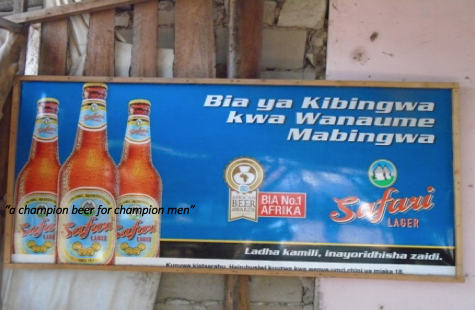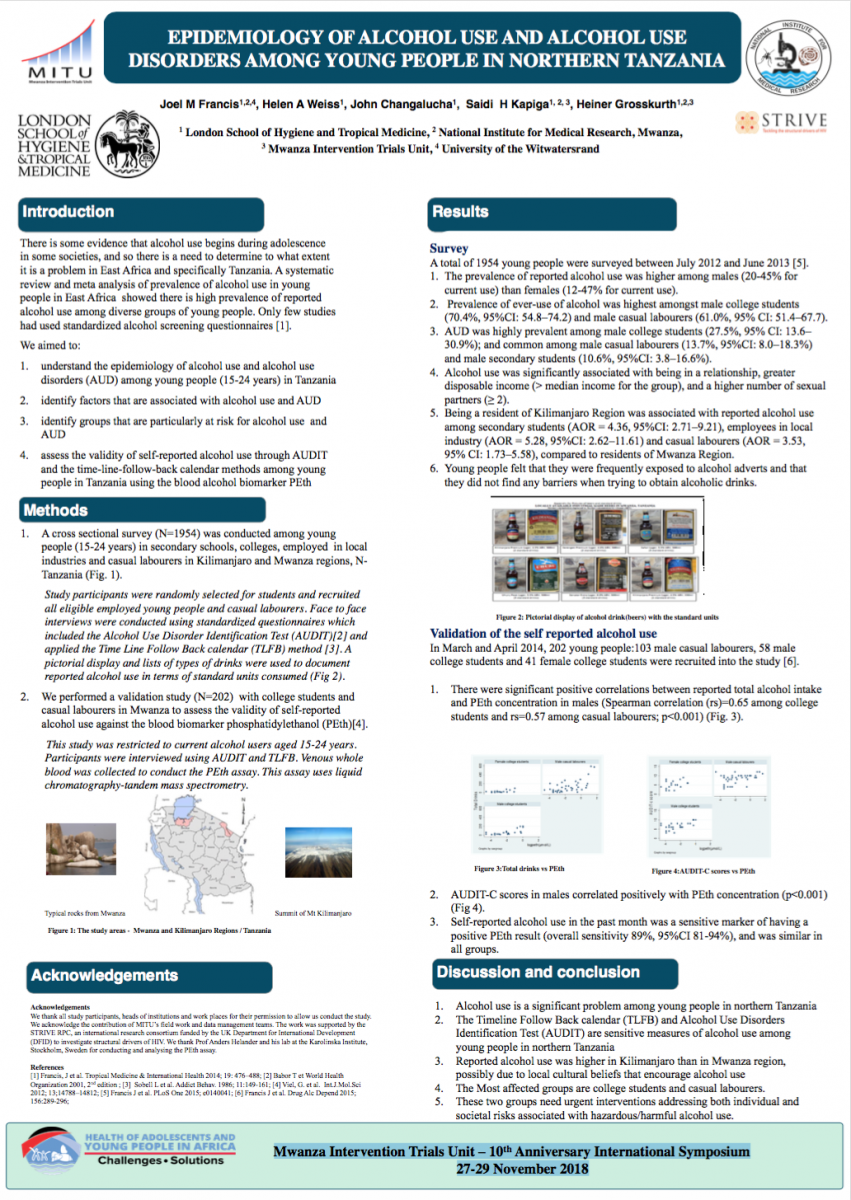Social space and alcohol use initiation among youth in northern Tanzania
Alcohol use is a key risk factor for disease worldwide. Consumption of alcohol is increasing in sub Saharan Africa, where youth are already at high risk of HIV due to its high prevalence in the region. Studies show that youth begin drinking alcohol early; however, there is a need to further explore the initiation of alcohol use in order to design appropriate interventions in this population.
Young peoples exposure to alcohol outlets and advertisement in Tanzania: Implications for HIV Interventions
This presentation was originally given by Haika Osaki (NIMR) at AIDS2018.

It presents findings from a qualitative study that explored young people's exposure to alcohol outlets and advertisments and documented alcohol availability, promotion and advertisement. The research found that:
Mapping Alcohol Availability to Youth in Tanzania, South Africa and India: Implications for structural interventions against HIV
This presentation was originally given by Gerry Mshana at the AIDS2018 conference. It provides an overview of STRIVE's research on alcohol in three countries:
Technical brief: Alcohol and HIV risk
Hazardous alcohol use contributes to the acquisition of HIV through sexual risk and speeds the progression of the disease.
Strategies exist to successfully reduce the harms caused by hazardous alcohol use, including HIV, but these have focused on individual-level interventions while neglecting the powerful role of unfettered alcohol availability, low prices and heavy advertising and promotion in low- and middle-income countries.
Impact case study: Youth voices in alcohol policy processes in South Africa
Alcohol misuse remains a major problem amongst South African youth and contributes to sexual health risks including HIV and sexual assault. Action at community and structural level is needed to ensure that youth live in environments which protect them from early and excessive alcohol consumption.
Evidence brief: Youth, alcohol use and HIV in Tanzania
Alcohol is an important risk factor for HIV worldwide. In 2016, 73% of new HIV infections among adolescents occurred in Africa - despite a decline in other populations - the prevalence among youth is increasing. Studies show that alcohol use influences behaviours such as multiple partnerships, unsafe sex and transactional sex that in turn increase the risk of contracting HIV. Efforts to address alcohol consumption in this region have mainly taken the form of interventions to reduce individual alcohol consumption, but these have not, in general proved effective.
Sugar, tobacco, and alcohol taxes to achieve the SDGs
The Sugar, Tobacco and Alcohol Taxes (STAX) Group have published a new Lancet Comment calling for a more integrated approach and action on sugar, tobacco and alcohol taxes to achieve the Sustainable Development Goals.
Key messages
Youth voices in alcohol policy processes in South Africa
Read the full impact case study here
Alcohol misuse remains a major problem amongst South African youth and contributes to sexual health risks including HIV and sexual assault. Action at community and structural level is needed to ensure that youth live in environments which protect them from early and excessive alcohol consumption.
Youth Perspectives on Alcohol: Availability and marketing in South Africa, Tanzania and India
Alcohol use among young people exposes them to a variety of social, economic and public health hazards and is one of the drivers of the HIV epidemic in developing countries. This Learning Lab presents findings from a STRIVE multi-country study in South Africa, Tanzania and India which assessed how alcohol availability and promotion affect young people’s sexual health and safety.
The researchers highlight shared and unique findings from the three contexts including:




